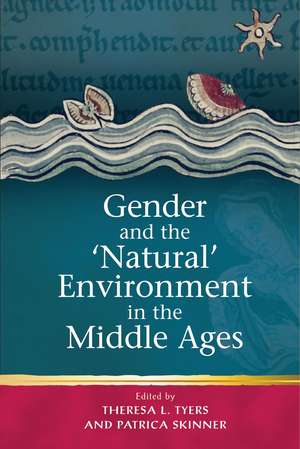Gender and the ''Natural' Environment in the Middle Ages: Religion and Culture in the Middle Ages
Editat de Theresa L. Tyers, Patricia Skinneren Limba Engleză Hardback – 27 noi 2023
Using written and visual evidence from c.1150–1500 CE—including medical, literary, and scientific works—the essays in this collection address the relationship between the human and the “natural” at a time when new worlds, new texts, and new religious experiences reshaped the individual and collective relationship with the cosmos.
Preț: 494.30 lei
Preț vechi: 537.29 lei
-8% Nou
Puncte Express: 741
Preț estimativ în valută:
94.59€ • 101.14$ • 78.86£
94.59€ • 101.14$ • 78.86£
Carte disponibilă
Livrare economică 28 martie-11 aprilie
Livrare express 13-19 martie pentru 29.90 lei
Preluare comenzi: 021 569.72.76
Specificații
ISBN-13: 9781837720576
ISBN-10: 1837720576
Pagini: 272
Ilustrații: 1 color plate, 11 halftones
Dimensiuni: 159 x 235 x 18 mm
Greutate: 0.43 kg
Editura: University of Wales Press
Colecția University of Wales Press
Seria Religion and Culture in the Middle Ages
ISBN-10: 1837720576
Pagini: 272
Ilustrații: 1 color plate, 11 halftones
Dimensiuni: 159 x 235 x 18 mm
Greutate: 0.43 kg
Editura: University of Wales Press
Colecția University of Wales Press
Seria Religion and Culture in the Middle Ages
Notă biografică
Theresa Tyers is a research fellow at the Centre for Medieval and Early Modern Research at Swansea University. Patricia Skinner is a former professor of history at Swansea University.
Cuprins
Foreword Laura Kalas
1. Introduction: Considering Nature Patricia Skinner and Theresa L. Tyers
WOMEN’S SPACES
2. Intersections of [Un]Nature, Power, and [Dis]Order: The Presentation of Elite Women in Medieval Chronicles Linda E. Mitchell
3. Gendering Treatment: Cupping by Female Practitioners in Late Medieval Visual Culture Jennifer Borland
4. Fracturing Boundaries: Domesticity and Agriculture Practices in a LateFourteenth
Century Manuscript Theresa L. Tyers
5. Distilling Nature: Raw Materials, ‘Artificial’ Remedies and the Human Body in the Later Middle Ages Elma Brenner
QUEER BODIES
6. Recreating the ‘Natural World’: The Medieval Oyster and her Pearl Diane Heath
7. Amazed and Ravished in the Medieval Garden: The Space of Lesbian Desire in The Assembly of Ladies and The Floure and the Leafe Michelle M. Sauer
8. Monstrous Hybrids, Maternal Sin, and the Concept of Species in Nicole Oresme’s De causis mirabilium Tim Wingard
BIBLIOGRAPHY OF WORKS CITED
1. Introduction: Considering Nature Patricia Skinner and Theresa L. Tyers
WOMEN’S SPACES
2. Intersections of [Un]Nature, Power, and [Dis]Order: The Presentation of Elite Women in Medieval Chronicles Linda E. Mitchell
3. Gendering Treatment: Cupping by Female Practitioners in Late Medieval Visual Culture Jennifer Borland
4. Fracturing Boundaries: Domesticity and Agriculture Practices in a LateFourteenth
Century Manuscript Theresa L. Tyers
5. Distilling Nature: Raw Materials, ‘Artificial’ Remedies and the Human Body in the Later Middle Ages Elma Brenner
QUEER BODIES
6. Recreating the ‘Natural World’: The Medieval Oyster and her Pearl Diane Heath
7. Amazed and Ravished in the Medieval Garden: The Space of Lesbian Desire in The Assembly of Ladies and The Floure and the Leafe Michelle M. Sauer
8. Monstrous Hybrids, Maternal Sin, and the Concept of Species in Nicole Oresme’s De causis mirabilium Tim Wingard
BIBLIOGRAPHY OF WORKS CITED
Recenzii
"In the wake of numerous new studies engaged with the concept of nature, which is now also studied through a medieval lens, this volume offers a range of fascinating papers that examine how individual medieval writers or artists viewed themselves within their material environment. While we find ourselves today in the Anthropocene, already in the pre-modern world, many voices can be heard that promoted a closely-knit entanglement of the material with the spiritual dimension. It would go too far to talk about harmony, but the typically medieval mindset, such as among mystics, certainly promoted an allegorical concept of nature we today might profit from under the current dangerous circumstances. A gender perspective, as pursued in a number of papers, strongly suggests medieval women’s unique approaches to their natural and social environment, especially when they situated themselves within a garden or conceived of the world as an oyster – or when they had to struggle against men’s tendency to relegate women into a gendered space to guarantee male authority, also with regard to nature. The study of 'nature' here leads to new insights into women’s individuality and even independence, or female identity."






